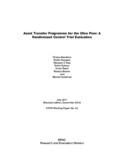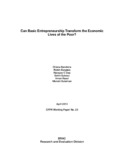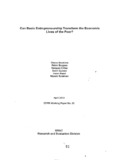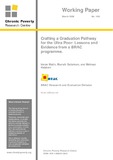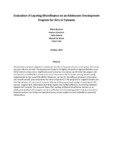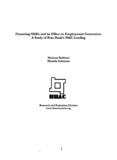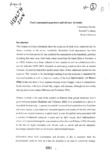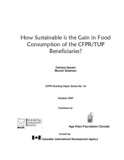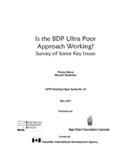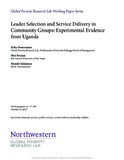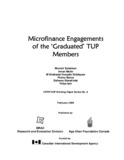Browsing by Author "Sulaiman, Munshi"
Now showing items 1-20 of 31
-
Agricultural extension and technology adoption for food security: Evidence from Uganda
Pan, Yao; Smith, Stephen C; Sulaiman, Munshi (Wiley Online Library, 2018-04-23)We evaluate causal impacts of a large-scale agricultural extension program for smallholder women farmers on technology adoption and food security in Uganda through a regression discontinuity design that exploits an arbitrary ... -
Asset transfer programme for the ultra poor: A randomized control trial evaluation
Bandiera, Oriana; Burgess, Robin; Das, Narayan C; Gulesci, Selim; Rasul, Imran; Shams, Raniya; Sulaiman, Munshi (BRAC Research and Evaluation Division, 2012-12)The world’s poorest people lack both capital and skills and are trapped in low return occupations. However, whether their economic lives can be transformed by programs which attempt to tackle both constraints by providing ... -
Can basic entrepreneurship transform the economic lives of the poor?
Bandiera, Oriana; Burgess, Robin; Das, Narayan C; Gulesci, Selim; Rasul, Imran; Sulaiman, Munshi (BRAC Research and Evaluation Division, 2013-04)Does the lack of capital and skills drive occupational choice and poverty? We provide evidence from a large scale and long term Randomized Control Trial of a program that simultaneously provides assets and training to the ... -
Can basic entrepreneurship transform the economic lives of the poor?
Bandiera, Oriana; Burgess, Robin; Das, Narayan C; Gulesci, Selim; Rasul, Imran; Sulaiman, Munshi (BRAC, 2013-04)Does the lack of capital and skills drive occupational choice and poverty? We provide evidence from a large scale and long term randomized control trial of a programme that simultaneously provides assets and training to ... -
Crafting a graduation pathway for the ultra-poor: Lessons and evidence from a BRAC program
Matin, Imran; Sulaiman, Munshi; Rabbani, Mehnaz (BRAC Research and Evaluation Division, 2008-03)The ultra poor are caught in a below-subsistence trap from which it is difficult for them to break free using available resources and mechanisms. Time is not an ally for the ultra poor, as things generally do not get ... -
Does wealth increase affect school enrolment in ultra-poor households: Evidence from an experiment in Bangladesh
Sulaiman, Munshi (Practical Action Publishing, 2015-06)Access to education is usually found to be highly correlated with household income and wealth. This correlation often instigates an expectation that increasing income of the poor households will lead to greater human capital ... -
Effects of food assistance: Evaluation of a food-for-training project in South Sudan
Sulaiman, Munshi (Practical Action Publishing, 2017)This chapter is part of the book titled What Works for Africa's Poorest: Poverty Reduction Programs for Extremely Poor People, which contains a unique cross-section of country-specific case studies from across Sub-Saharan ... -
Evaluation of layering microfinance on an adolescent development program for girls in Tanzania
Buehren, Niklas; Goldstein, Markus; Gulesci, Selim; Sulaiman, Munshi; Yam, Venus (2015-10)The paper evaluates a program targeted towards adolescent women in Tanzania and aims to empower them both economically and socially. The program was found to be highly successful in Uganda in terms of economic, health and ... -
Financing SMEs and its effect on employment generation: a study of brae bank's SME lending
Rabbani, Mehnaz; Sulaiman, Munshi (BRAC, 2005)Financial and development assistance designed specially for small and medium enterprises in Bangladesh is a new and upcoming trend. After the surge of micro-finance in the last two decades, small and medium enterprises ... -
Food consumption pattern and dietary diversity
Jalal, Chowdhury SB; Choudhury, Nuzhat; Sulaiman, Munshi (BRAC Research and Evaluation Division (RED), 2008) -
How sustainable are benefits from extension for smallholder farmers? Evidence from a randomized phase-out of the BRAC Program in Uganda
Fishman, Ram; Smith, Stephen C.; Bobić, Vida; Sulaiman, Munshi (SSRN, 2017-03-26)Many development programs are based on short-term interventions, either because of external funding constraints or because it is assumed that impacts persist post program termination ("sustainability"). Using a novel ... -
How sustainable is the gain in food consumption of the CFPR/TUP beneficiaries?
Haseen, Farhana; Sulaiman, Munshi (BRAC Research and Evaluation Division and Aga Khan Foundation Canada, 2007-10)Despite some remarkable improvements in nutritional status, malnutrition in Bangladesh is still highly prevalent, especially among the poorest. A number of initiatives are taking place that address the food intake of the ... -
Impact assessment of CFPR/TUP: A descriptive analysis based on 2002-2005 panel data
Rabbani, Mehnaz; Prakash, Vivek A.; Sulaiman, Munshi (BRAC Research and Evaluation Division and Aga Khan Foundation Canada, 2006-07)The paper sets out to explore the achievements of civil society in the area of poverty reduction. The focus is mainly on three domains (1) Advocacy, (2) Policy Change, and (3) Service Delivery. Three case studies illustrate ... -
Intentions to participate in adolescent training programs: Evidence from Uganda
Bandiera, Oriana; Goldstein, Markus; Rasul, Imran; Burgess, Robin; Gulesci, Selim; Sulaiman, Munshi (Oxford Academic, 2010-05-01)Almost one-third of the population in developing countries is under age 15. Hence improving the effectiveness of policy interventions that target adolescents might be especially important. We analyze the intention to ... -
Is the BDP ultra-poor approach working? Survey of some key issues
Barua, Proloy; Sulaiman, Munshi (BRAC Research and Evaluation Division and Aga Khan Foundation Canada, 2007-05)Though BRAC’s CFPR/TUP is the specialized program for the ultra-poor, it is observed that a good portion of its microfinance clients are also very poor and require special attention. Moreover, some of the poorer households ... -
Labor markets and poverty in village Economies
Bandiera, Oriana; Burgess, Robin; Das, Narayan Chandra; Gulesci, Selim; Rasul, Imran; Sulaiman, Munshi (Oxford Academic, 2017-03-20)We study how women's choices over labor activities in village economies correlate with poverty and whether enabling the poorest women to take on the activities of their richer counterparts can set them on a sustainable ... -
Leader selection and service delivery in community groups: Experimental evidence from Uganda
Deserranno, Erika; Stryjan, Miri; Sulaiman, Munshi (Global Poverty Research Lab Working Paper, 2017-10-31)In developing countries, NGOs and governments often rely on local community-based groups for the delivery of financial and public services. This paper provides causal evidence of how the design of rules used for group ... -
Livelihood, cash Transfer, and graduation approaches: How do they compare in terms of cost, impact, and targeting?
Sulaiman, Munshi (International Food Policy Research Institute (IFPRI), 2018-10)Social protection initiatives in Africa increasingly aim to institutionalize systems that guarantee assistance for the poor and protect the vulnerable against livelihood risks. Through direct and indirect income effects, ... -
Microfinance Engagements of the ‘Graduated’ TUP members
Sulaiman, Munshi; Matin, Imran; Siddiquee, M Shahadat Hossain; Barua, Proloy; Alarakhaia, Safeena; Iyer, Vidya (BRAC Research and Evaluation Division and Aga Khan Foundation Canada, 2006-02)Despite the slogan of ‘credit for the poorest of the poor’, the poorest have not fully benefited from the microfinance revolution of the late 90s in Bangladesh. To bring these ‘left out’ group into the mainstream microfinance, ... -
Moral hazard: Experimental evidence from tenancy contracts
Burchardi, Konrad B; Gulesci, Selim; Lerva, Benedetta; Sulaiman, Munshi (Oxford Academic, 2018)Agricultural productivity is particularly low in developing countries. Output-sharing rules that make farmers less-than-full residual claimants are seen as a potentially important driver of low agricultural productivity. ...

